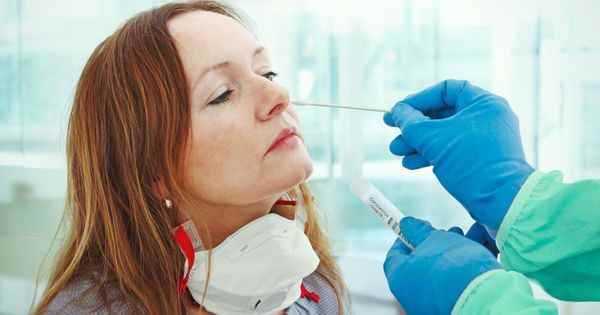Posted ,
Reading 2 mins.
With the ongoing Covid-19 pandemic, we are required to regularly perform nasopharyngeal tests. Can they be dangerous? What are the precautions to take before making them? Let’s take stock of the issue.
The Omicron wave continues and with it the number of nasopharyngeal tests carried out daily by a good number of French people. The figures reached a record with 12 million tests carried out in a week at the start of December, more than 8 million at the start of January and 1.6 million last week.
It all depends on who is taking the sample.
As the need to carry out antigen or PCR tests has increased, the question of samplers has arisen. The test should normally be carried out by a healthcare professional, but unfortunately this is not always the case.
Students were recruited via private companies and quickly trained to take the samples, before the government published a decree on January 20 authorizing 16 new professions to take nasopharyngeal samples: opticians, speech therapists, dieticians, dentists or more vets.
An uncomplicated but technical gesture
According to the president of the Union of pharmacists’ unions (USPO), Pierre-Olivier Variot interviewed by our colleagues from 20 minutes: “The gesture is not complicated, but it is technical, and must be accomplished meticulously and gently, so as not to injure the nasal septum..
In order to limit the risk of complications, the National Academy of Medicine recommends “inquire, before any sampling, of any accidental or surgical history of the ENT sphere that could modify the anatomy of the nasal and sinus cavities”.
Consult a GP online
The Academy of Medicine launches the alert
Already last April, the Academy was alarmed by the repetition of PCR and antigen tests and their potential risk. She recalls that “faced with the multiplication and repetition of samples, sometimes carried out in unsuitable conditions”, some complications are associated with this screening method. Some are “mild”, such as “inconvenience, pain or bleeding”, but others are more serious. “Serious complications are beginning to be described in the medical literature, in particular breaches of the anterior level of the base of the skull associated with a risk of meningitis., explained the Academy of Medicine. It is based in particular on a publication reporting cases of meningitis caused by a leak of cerebrospinal fluid, in the National Library of Medicine.
However, several ENTs questioned on the issue want to be reassuring and believe that this risk is “very rare” and the complications following a PCR test, “exceptional”.
